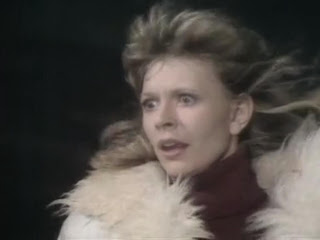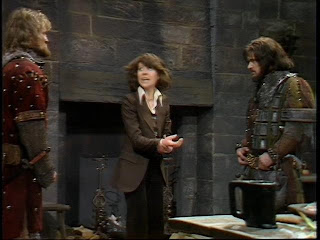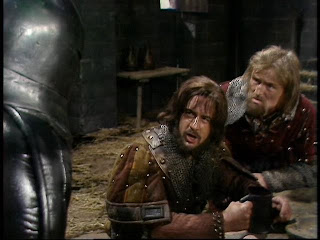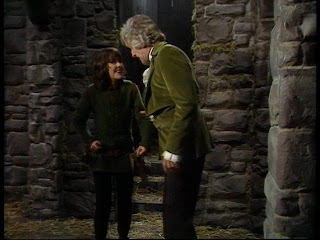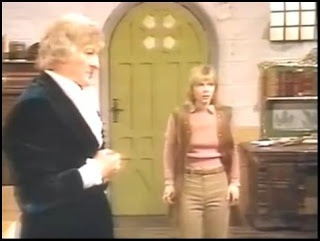Showing posts with label Brigadier Lethbridge-Stewart. Show all posts
Showing posts with label Brigadier Lethbridge-Stewart. Show all posts
Sunday, November 20, 2011
Terror of the Zygons
Terror of the Zygons is one of those serials that has a reputation. There are a few of these, the stories that are generally considered classics (or the opposite). Usually, even if the story is flawed, it's clear what makes it great.
But Zygons' popularity seems somewhat inexplicable to me. It's a fun yarn, but the idea that it's one of the all-time-greats of Who - particularly in a season including Pyramids, Morbius, and Seeds of Doom is strange.
Sunday, August 28, 2011
The Green Death
Tuesday, August 2, 2011
The Three Doctors
Let's reflect for a moment on just how insane this story is: three different incarnations of the same character working together for a single story. Think of how crazy it would be to watch a Bond movie, except with Sean Connery, Roger Moore, and Timothy Dalton all playing different Bonds working together. Or a Sherlock Holmes movie with Basil Rathbone, Jeremy Brett, and Robert Downey Jr. Or Batman with Adam West, Michael Keaton, and Christian Bale. It's a crazy notion of metafiction, forcing together three things that are the same, and yet totally incompatible. It's fun to mess around with that sort of thing, but the fact is that it just doesn't work on a literal level. It's just not possible within those stories for multiple ones to exist together. Plus, the clash of styles would be in many ways incompatible.
So it's worth noting just how crazy this show is that putting three Doctors together in the same story not only works, but seems absolutely natural and normal.
Wednesday, March 23, 2011
The Time Warrior
[1973/1974, Season 11, Serial 1]
The Time Warrior stands at an interesting point in Doctor Who's history, and is an important story. First off, it has an awesome new title sequence, created with the slitscan technique from 2001: A Space Odyssey and introducing the logo that would become synonymous with Tom Baker's era.
It's the opening of the 11th season, which producer Barry Letts and script editor Terrance Dicks decided would be their last. It's clear even here that their era is coming to an end. With Roger Delgado tragically killed in a car accident, the Master was no longer the kind of recurring character he had been, and wouldn't be seen again for several seasons. Jo Grant, who had been the Doctor's companion for three years, had exited at the end of The Green Death the previous season. UNIT no longer carries the importance of the previous four seasons. The Brigadier gets a few good exchanges with the Doctor at the beginning, but disappears before the end of the first episode.
The Time Warrior is also one of the earliest "pseudo-historicals", the tales set in Earth's past but with a sci-fi plot. It had been done a few times before - The Time Meddler is probably the best example - but in general, it was still a fairly rare concept. Nowadays, it takes up about a third of every season... It also introduces the Sontarans, a race who define themselves entire through war.
But none of that is what makes this episode really important. No, what truly makes this one of the turning points of the show is the companion: Sarah Jane Smith.
Sarah Jane is the perfect template for a companion. She's strong, brave, resourceful, and independent. She gets captured in this story, but she always breaks herself out; she doesn't need the Doctor to rescue her. In fact, she rescues the Doctor on more than one occasion. She shows supreme self-confidence, and is more than willing to cut the Doctor down to size. Here, in her first adventure, she spends much of the story believing the Doctor to be the villain, and takes a long time (understandably) to fully trust him. It's a blast to watch her carry so much of the story through her own strength. And she abjectly refuses to make coffee for the Doctor.
But she can also be vulnerable and scared when necessary. Elizabeth Sladen is wonderful throughout. She was cast for her ability to show both fear and courage at the same time, something she does superbly, but Sladen pours herself into every moment of the role. Her first scene, meeting the Doctor, is terrific. He almost immediately sees through her cover story for sneaking into a top secret science complex, but she just as quickly figures out that he probably won't give her away; her knowing smile when she asks him why he won't give her up is a perfect touch. Later in the story, I love the scene where she meets Irongron, and is so fiery that he decides not to throw her in the dungeon and just leaves her standing around for awhile so her antics can amuse him. She's funny, wistful, and just totally charming. And she has great chemistry with Pertwee; it's just a blast to watch them together. She's completely engaging and full of personality, and single-handedly elevates the tale.
Not that it isn't good anyway. It's a Robert Holmes script, and as expected, it's more dialogue-driven than anything else, but what awesome dialogue!
The Doctor: A straight line may be the shortest distance between two points, but it is by no means the most interesting,
Sarah Jane: You're serious, aren't you?
The Doctor: About what I do, yes. Not necessarily about the way I do it.
Linx: What is this?
Irongron: Oh, just a girl, taken in the forest.
Linx: Girl? You have two species on this planet?!
Irongron: How say you?
Linx: The girl is not of your kind, Irongron. The hair is finer, the thorax of a different construction...
Irongron: Oh, Hell's teeth, have you no girls beyond the stars? No women to do the lowly work?
Linx: Ah, I understand. You have a primary and secondary reproductive cycle. It is an inefficient system. You should change it.
Sarah Jane: Oh, I could murder a cup of tea.
He does a nice job with the medieval dialogue - it's wordy enough to sound convincingly old-fashioned but not so much it's ever confusing or distracting. More importantly, it has as much wit and style as the more modern dialogue. And as you'd expect from Holmes, The Time Warrior has a gallery of great characters.
The villains are a blast together. The arrogant Irongron thinks he's far, far smarter than he really is, and keeps trying to undermine the technologically and intellectually superior Linx, and gets by with a couple minor victories in their verbal sparring through sheer persistence. David Daker is hilarious as the bandit, but manages to be intimidating and threatening as well when need be.
Linx is the more memorable of the two, though, as the first Sontaran to show up in Doctor Who. Despite a few rough edges, the makeup design is excellent, and makes him one of the most convincing aliens on the show. And the race itself is interesting: a clone race of warriors, inherently tough physically anyway, but with the addition of their armor, incredibly difficult to kill except for a small vent on the back of the neck. They prefer it that way, so that they're always forced to face forward in battle, and can never retreat. Very cool.
The third villain, Bloodaxe, is Irongron's right hand man, and thinks he's pretty much the coolest guy in the entire world, and remains completely oblivious to what an idiot his boss really is. John J. Carney is highly amusing in the role.
Irongron: I'll chop him up so fine not even a sparrow will fill its beak!
Bloodaxe: [in awe] Yours is indeed a towering intelligence!
There are two other major supporting characters. The first, Rubeish, is a charming, witty variation on the absent-minded professor. He's so near-sighted that, because he doesn't have his glasses, Linx can't hypnotize him, allowing him to help the Doctor to what little extend his near-blindness allows. Mostly, though, he just adds to the overall sense of fun.
Rubeish: I haven't seen my wife and family for three days.
Doctor: Well, I'm sorry to hear that.
Rubeish: Ah well. Just shows there's always a silver lining.
The other is Hal the archer, played forcefully and charismatically by Jeremy Bulloch. He's likable and engaging enough that he might have even made a pretty good companion, though with Sarah Jane around, he wasn't really needed.
The less important characters are also good - the Lord and Lady of the nearby castle, despite only having a few scenes, have a well-developed relationship and personalities. You get a real sense of who they are in just a handful of lines. Even minor one-sceen characters are interesting individuals - they all have interesting things to say and do and add to the setting.
And, of course, there's the Doctor, who's as brilliant as ever. Pertwee is at the top of his game, swinging from chandeliers, passionately decrying evil, wittily cutting down his opponents, and just generally being the dashing, heroic figure he so perfectly created in his version of the character.
Director Alan Bromly generally does a good job giving a dialogue-dirven script plenty of energy and capturing the midieval atmosphere well enough. Unfortunately, though, while it's a perfectly adequate approach, he doesn't bring any passion to his storytelling. In particular, he doesn't seem terribly interested in the action scenes - they're competantly staged but indifferently shot and edited, and as a consequence, exciting enough but nowhere near as thrilling as they should be. Barry Letts tells a story that for the climax, which called for a castle to be blown up, he told Bromly that they could, in fact, blow up a model castle (and it's worth noting here that blowing up models is the one special effect that Doctor Who consistently does well) ... and Bromly turned it down, saying he would cut it together in a way that would work. He spliced in two seconds of a quarry blowing up.
Bromly should have been ashamed of himself. NOTE TO ALL DIRECTORS OF ANY AND EVERY FILM OR TELEVISION MEDIUM: If your producer tells you that you have the resources, money, and time to film the massive explosion your climax calls for, don't turn him down. That may just be the worst decision every made by any director in the history of television, possibly excepting the entirety of the Star Wars Christmas Special. Seriously, what was Bromly thinking?
Point being, the climax, while not unexciting, isn't the thrill ride it should be, despite big stunts, various acts of derring-do, treachery, archery, and a castle blowing up (or what was supposed to be a castle blowing up). But, to be fair, Holmes doesn't come up with a perfect conclusion. (though the castle blowing up was an excellent idea, Bromly) It's satisfying enough, but the Linx/Irongron double-act doesn't fully pay off, and there's nothing particularly memorable about the way he wraps up outside of those few elements Bromly botches. Really, though, it's more Bromly than Holmes; with a Douglas Camfield or David Maloney or Graeme Harper directing, I'm sure it would have been terrific. Heck, if Letts himself had directed it like he originally planned, it would have been great.
Ultimately, The Time Warrior has all the elements of a classic, but falls short due to Bromly's lack of adventurousness and Holmes not quite figuring out how to wrap things up. But it's a total delight nonetheless, consistently entertaining and a lot of fun, and is a must-see for the introduction of the greatest companion the Doctor ever had in Sarah Jane Smith.
RATING:
* * *
SIDENOTES:
The Time Warrior stands at an interesting point in Doctor Who's history, and is an important story. First off, it has an awesome new title sequence, created with the slitscan technique from 2001: A Space Odyssey and introducing the logo that would become synonymous with Tom Baker's era.
It's the opening of the 11th season, which producer Barry Letts and script editor Terrance Dicks decided would be their last. It's clear even here that their era is coming to an end. With Roger Delgado tragically killed in a car accident, the Master was no longer the kind of recurring character he had been, and wouldn't be seen again for several seasons. Jo Grant, who had been the Doctor's companion for three years, had exited at the end of The Green Death the previous season. UNIT no longer carries the importance of the previous four seasons. The Brigadier gets a few good exchanges with the Doctor at the beginning, but disappears before the end of the first episode.
The Time Warrior is also one of the earliest "pseudo-historicals", the tales set in Earth's past but with a sci-fi plot. It had been done a few times before - The Time Meddler is probably the best example - but in general, it was still a fairly rare concept. Nowadays, it takes up about a third of every season... It also introduces the Sontarans, a race who define themselves entire through war.
But none of that is what makes this episode really important. No, what truly makes this one of the turning points of the show is the companion: Sarah Jane Smith.
Sarah Jane is the perfect template for a companion. She's strong, brave, resourceful, and independent. She gets captured in this story, but she always breaks herself out; she doesn't need the Doctor to rescue her. In fact, she rescues the Doctor on more than one occasion. She shows supreme self-confidence, and is more than willing to cut the Doctor down to size. Here, in her first adventure, she spends much of the story believing the Doctor to be the villain, and takes a long time (understandably) to fully trust him. It's a blast to watch her carry so much of the story through her own strength. And she abjectly refuses to make coffee for the Doctor.
But she can also be vulnerable and scared when necessary. Elizabeth Sladen is wonderful throughout. She was cast for her ability to show both fear and courage at the same time, something she does superbly, but Sladen pours herself into every moment of the role. Her first scene, meeting the Doctor, is terrific. He almost immediately sees through her cover story for sneaking into a top secret science complex, but she just as quickly figures out that he probably won't give her away; her knowing smile when she asks him why he won't give her up is a perfect touch. Later in the story, I love the scene where she meets Irongron, and is so fiery that he decides not to throw her in the dungeon and just leaves her standing around for awhile so her antics can amuse him. She's funny, wistful, and just totally charming. And she has great chemistry with Pertwee; it's just a blast to watch them together. She's completely engaging and full of personality, and single-handedly elevates the tale.
Not that it isn't good anyway. It's a Robert Holmes script, and as expected, it's more dialogue-driven than anything else, but what awesome dialogue!
The Doctor: A straight line may be the shortest distance between two points, but it is by no means the most interesting,
Sarah Jane: You're serious, aren't you?
The Doctor: About what I do, yes. Not necessarily about the way I do it.
Linx: What is this?
Irongron: Oh, just a girl, taken in the forest.
Linx: Girl? You have two species on this planet?!
Irongron: How say you?
Linx: The girl is not of your kind, Irongron. The hair is finer, the thorax of a different construction...
Irongron: Oh, Hell's teeth, have you no girls beyond the stars? No women to do the lowly work?
Linx: Ah, I understand. You have a primary and secondary reproductive cycle. It is an inefficient system. You should change it.
Sarah Jane: Oh, I could murder a cup of tea.
He does a nice job with the medieval dialogue - it's wordy enough to sound convincingly old-fashioned but not so much it's ever confusing or distracting. More importantly, it has as much wit and style as the more modern dialogue. And as you'd expect from Holmes, The Time Warrior has a gallery of great characters.
The villains are a blast together. The arrogant Irongron thinks he's far, far smarter than he really is, and keeps trying to undermine the technologically and intellectually superior Linx, and gets by with a couple minor victories in their verbal sparring through sheer persistence. David Daker is hilarious as the bandit, but manages to be intimidating and threatening as well when need be.
Linx is the more memorable of the two, though, as the first Sontaran to show up in Doctor Who. Despite a few rough edges, the makeup design is excellent, and makes him one of the most convincing aliens on the show. And the race itself is interesting: a clone race of warriors, inherently tough physically anyway, but with the addition of their armor, incredibly difficult to kill except for a small vent on the back of the neck. They prefer it that way, so that they're always forced to face forward in battle, and can never retreat. Very cool.
The third villain, Bloodaxe, is Irongron's right hand man, and thinks he's pretty much the coolest guy in the entire world, and remains completely oblivious to what an idiot his boss really is. John J. Carney is highly amusing in the role.
Irongron: I'll chop him up so fine not even a sparrow will fill its beak!
Bloodaxe: [in awe] Yours is indeed a towering intelligence!
There are two other major supporting characters. The first, Rubeish, is a charming, witty variation on the absent-minded professor. He's so near-sighted that, because he doesn't have his glasses, Linx can't hypnotize him, allowing him to help the Doctor to what little extend his near-blindness allows. Mostly, though, he just adds to the overall sense of fun.
Rubeish: I haven't seen my wife and family for three days.
Doctor: Well, I'm sorry to hear that.
Rubeish: Ah well. Just shows there's always a silver lining.
The other is Hal the archer, played forcefully and charismatically by Jeremy Bulloch. He's likable and engaging enough that he might have even made a pretty good companion, though with Sarah Jane around, he wasn't really needed.
The less important characters are also good - the Lord and Lady of the nearby castle, despite only having a few scenes, have a well-developed relationship and personalities. You get a real sense of who they are in just a handful of lines. Even minor one-sceen characters are interesting individuals - they all have interesting things to say and do and add to the setting.
And, of course, there's the Doctor, who's as brilliant as ever. Pertwee is at the top of his game, swinging from chandeliers, passionately decrying evil, wittily cutting down his opponents, and just generally being the dashing, heroic figure he so perfectly created in his version of the character.
Director Alan Bromly generally does a good job giving a dialogue-dirven script plenty of energy and capturing the midieval atmosphere well enough. Unfortunately, though, while it's a perfectly adequate approach, he doesn't bring any passion to his storytelling. In particular, he doesn't seem terribly interested in the action scenes - they're competantly staged but indifferently shot and edited, and as a consequence, exciting enough but nowhere near as thrilling as they should be. Barry Letts tells a story that for the climax, which called for a castle to be blown up, he told Bromly that they could, in fact, blow up a model castle (and it's worth noting here that blowing up models is the one special effect that Doctor Who consistently does well) ... and Bromly turned it down, saying he would cut it together in a way that would work. He spliced in two seconds of a quarry blowing up.
Bromly should have been ashamed of himself. NOTE TO ALL DIRECTORS OF ANY AND EVERY FILM OR TELEVISION MEDIUM: If your producer tells you that you have the resources, money, and time to film the massive explosion your climax calls for, don't turn him down. That may just be the worst decision every made by any director in the history of television, possibly excepting the entirety of the Star Wars Christmas Special. Seriously, what was Bromly thinking?
Point being, the climax, while not unexciting, isn't the thrill ride it should be, despite big stunts, various acts of derring-do, treachery, archery, and a castle blowing up (or what was supposed to be a castle blowing up). But, to be fair, Holmes doesn't come up with a perfect conclusion. (though the castle blowing up was an excellent idea, Bromly) It's satisfying enough, but the Linx/Irongron double-act doesn't fully pay off, and there's nothing particularly memorable about the way he wraps up outside of those few elements Bromly botches. Really, though, it's more Bromly than Holmes; with a Douglas Camfield or David Maloney or Graeme Harper directing, I'm sure it would have been terrific. Heck, if Letts himself had directed it like he originally planned, it would have been great.
Ultimately, The Time Warrior has all the elements of a classic, but falls short due to Bromly's lack of adventurousness and Holmes not quite figuring out how to wrap things up. But it's a total delight nonetheless, consistently entertaining and a lot of fun, and is a must-see for the introduction of the greatest companion the Doctor ever had in Sarah Jane Smith.
RATING:
* * *
SIDENOTES:
- Jeremy Bulloch is probably best known for playing Boba Fett in the original Star Wars films, but he also played another character in Doctor Who about ten years earlier in The Space Museum, although that role mostly just asked him to stand around with his arms akimbo. He's much, much better here with an actual role.
- The DVD is one of the occasional releases where the Restoration Team added CGI effects to try to make up for the low-budget old ones. While I certainly appreciate their efforts, I've always found these to be a bit hit-or-miss. When they work, they lift the story to an even higher level - Dalek Invasion of Earth and Earthshock come to mind. But too often, they're jarring because the CGI often looks like CGI. This, unfortunately, is one of those cases. Yes, it's nice to see the castle blow up, but they're too obviously CGI flames. Yes, it's nice to see the spacecraft flying toward the earth, but it looks just as cheap as the original shots, even if they are a tad more dynamic. But hey, you can't get it right all the time, and I'm really glad for the times when their additions work. (and I'm really looking forward to their version of Day of the Daleks) And I'm especially glad that they consistently make the original version the default way of watching, and their altered versions in the special features.
Monday, February 21, 2011
Terror of the Autons
[1971 – Season 8, Serial 1]
We begin in a circus. Luigi Rossini, the owner, is stopped in his tracks by an astonishing event. A sound familiar to us occurs: the whine of a TARDIS – but not the Doctor’s. A van appears directly in front of Rossini. Out of the trailer steps a man dressed in black. He introduces himself, saying he is usually referred to as The Master. Rossini, assuming this guy is a conjurer looking for a job, tries to throw him out. The Master turns towards him an hypnotizes him with a single look. Rossini is his to command.
And with that, we are introduced to the man who would become the Doctor’s arch-nemesis: fellow Time Lord, childhood best friend, now lost to evil. Roger Delgado could not have been more perfectly cast; his Master is magnetic and fascinating. While the Master would eventually lose some of his effectiveness through overuse, he makes a knockout impression here.
In his first story, he is working with the Nestine Consciousness, head of the Autons, those horrific plastic creatures from Spearhead In Space. He aids their attempt to conquer the earth for reasons known only to him.
Terror of the Autons is, in many ways, a milestone Doctor Who story. It completes the UNIT family by introducing Captain Mike Yates. It introduces Jo Grant, who would be the Third Doctor’s companion for three years. And above all, it introduces the Doctor’s archenemy. The Master comes off very well; writer Robert Holmes makes the mix of friendship and mortal rivalry between him and the Doctor compelling and fun.
Ms. Grant’s debut is a bit more controversial. Jo is often regarded as a big step back for feminism, with her meek personality, clumsiness, and apparent uselessness. I think people who see only that side of her are totally missing the point (or only watching her lousy episodes). She’s very much like a good version of Harley Quinn: a relentlessly cheerful, bubbly girl on the surface, and as a consequence constantly underestimated by everyone. But when pushed to it, she shows incredible resourcefulness and bravery, and outwits her apparent betters. I think it’s a joy to watch her, and it’s only helped by the perfect casting.
Katy Manning is so perfectly cast as Jo that it’s easy to forgive her occa… for… I… I… I can’t do it. I can’t say anything even kindly or slightly negative. She’s just so cute, so nice, so sweet. It’d be like kicking a puppy. She’s perfectly wonderful. What’s more, her chemistry with Pertwee is evident right from the beginning; it’s a joy to see these two together.
The other introduction, that of Captain Mike Yates, isn’t so effective. Eventually, the writers would get around to giving him some interesting stuff to do, but here, he evidences no semblance of personality or character. But he’s kept in the background, so it’s no real loss. Otherwise, UNIT is used pretty well. It’s of course wonderful to see the Brig, and UNIT gets in on the action in some good action scenes late in the story.
The Autons have to share the villain light with the Master, which unfortunately means one of them is going to get the short end of the stick, and it’s the otherworldly plastic abominations. They barely appear in the story, and their appearance is lessened by the bigheaded masks they wear, making them far less terrifying.
Still, they have three terrific moments in the story. The fight in the quarry is scary and thrilling, and stands as one of the great moments of the early ‘70s. Their attack on Jo with the flower is incredibly unsettling. And their murder of an unfortunately victim with a hideous plastic doll is both creepy and darkly funny, which makes for quite an uneasy scene.
Given this is a Robert Holmes script, characterization and dialogue is great. Besides the Master and Jo, he does a perfectly fine job with the Doctor and the Brig, and adds two more characters vividly sketched in a limited time: Rex Farrel and his father, Farrel Sr. With just one scene between them, you learn everything about their relationship and the younger Farrel. The father comes across as an overbearing patriarch, disappointed in his son, and obviously unsympathetic, though his strong-willed resistance to the Master gives him points. But when he goes home to his wife, their dialogue totally fleshes him out into a sympathetic, three-dimensional character. He only gets those three scenes, none of them very long, but he’s completely humanized in those brief moments.
The younger Farrel gets a bit more screentime, and does eventually become more than the Master’s hapless victim himself. The portrayal by Michael Wisher is very strong, though fans know he has a much more unforgettable appearance in a later serial…
And the Doctor? Jon Pertwee’s Third Doctor was a man of action, who jumped right into the fray with the full force of his charm, wit, and intelligence. He’s patronizing, egotistic, funny, and totally heroic. He’s one of the most three-dimensional of the Doctors; his flaws aren’t limited to the obvious flaws of the Doctor, nor are his good points limited to his power and heroism. Holmes, not surprisingly, gives him plenty to work with.
Rossini: I don't think my friend's going to like you.
Doctor: I'm sure of it.
Doctor: How much are they paying you?
Rossini: Come, come, Doctor, gentlemen don't discuss money.
Doctor: Nonsense. Gentlemen never talk about anything else.
Jo: Doctor, stop being childish.
Doctor: What's wrong with being childish? I like being childish.
I love the way the Doctor turns on the "pen-pusher" in Episode 3, and then pretty much turns him to his side in a few smooth lines of dialogue. I also love the very knowing look Jo gives the Doctor when he calls the Master self-conceited.
For all its good point, Terror of the Autons doesn’t really amount to much. It’s another invasion of Earth, foiled at the last minute. Other than the Master’s last bit, the finale has little tension or meaning. It’s done very well, of course, but it’s a pretty weak story to hang such wonderful execution on. Still, great execution of a so-so story in almost every aspect is more than worth a look. It may not be special or particularly compelling, but it’s very entertaining.
* * *
Subscribe to:
Posts (Atom)


